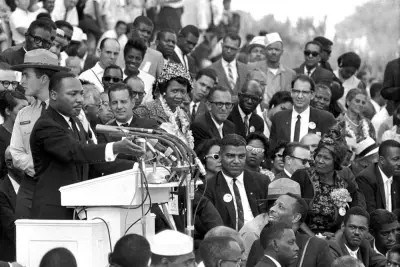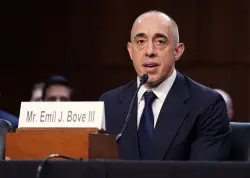Things to know about the release of federal documents related to MLK’s assassination

By ADRIAN SAINZ, Associated Press MEMPHIS, Tenn. (AP) — Federal records related to the investigation into the 1968 assassination of the Rev. Martin Luther King Jr. have been released, following the disclosure in March of tens of thousands of documents about the 1963 assassination of President John F. Kennedy. In January, President Donald Trump ordered the release of thousands of classified governmental documents about Kennedy’s assassination, while also moving to declassify federal records related to the deaths of New York Sen. Robert F. Kennedy and King more than five decades ago. Trump ordered Director of National Intelligence Tulsi Gabbard and Attorney General Pam Bondi to coordinate with other government officials to review records related to the assassinations of RFK and King and present a plan to the Republican president for their “complete release.” Some 10,000 pages of records about the RFK assassination were released April 18. Justice Department attorneys asked a federal judge to end a sealing order for the records nearly two years ahead of its expiration date. The Southern Christian Leadership Conference, which King led, is opposed to unsealing any of the records for privacy reasons. The organization’s lawyers said King’s relatives also wanted to keep the files under seal. FILE – Demonstrators walk to the courthouse behind the Rev. Martin Luther King Jr. in Montgomery, Ala., March 17, 1965, to protest treatment of demonstrators by police during an attempted march. (AP Photo/File) Scholars, history buffs and journalists have been preparing to study the documents to find new information about the civil rights leader’s April 4, 1968, assassination in Memphis, Tennessee. The King family’s statement released after Trump’s order in January said the family hoped to get an opportunity to review the files before their public release. King’s family, including his two living children, Martin III and Bernice, was given advance notice of Monday’s release and had its own teams reviewing the records ahead of the public disclosure. In a statement Monday, King’s children called their father’s case a “captivating public curiosity for decades.” But they emphasized the personal nature of the matter and urged “these files must be viewed within their full historical context.” “We ask those who engage with the release of these files to do so with empathy, restraint, and respect for our family’s continuing grief,” the statement said. Here’s what we know about the assassination and what scholars had to say ahead of the release of the documents: In Memphis, shots ring out FILE – Rev. Martin Luther King, Jr. walks across the balcony of the Lorraine Motel in Memphis, April 3, 1968. (AP Photo/Charles Kelly, File) King was standing on the balcony of the Lorraine Motel, heading to dinner with friends, when he was shot and killed. King had been in Memphis to support a sanitation workers strike protesting poor working conditions and low pay. The night before the assassination, King delivered the famous “Mountaintop” speech on a stormy night at the Mason Temple in Memphis. An earlier march on Beale Street had turned violent, and King had returned to Memphis to lead another march as an expression of nonviolent protest. King also had been planning the Poor People’s Campaign to speak against economic injustice. The FBI’s investigation After a long manhunt, James Earl Ray was captured in London, and he pleaded guilty to assassinating King. He later renounced that plea and maintained his innocence until his death in 1998. FBI documents released over the years show how the bureau wiretapped King’s telephone lines, bugged his hotel rooms and used informants to get information against him. “He was relentlessly targeted by an invasive, predatory, and deeply disturbing disinformation and surveillance campaign,” the King family said. King family’s response to the investigation Members of King’s family, and others, have questioned whether Ray acted alone or if he was even involved. King’s widow, Coretta Scott King, asked for the probe to be reopened, and in 1998, then-Attorney General Janet Reno directed the Civil Rights Division of the U.S. Justice Department to do so. The Justice Department said it “found nothing to disturb the 1969 judicial determination that James Earl Ray murdered Dr. King.” Dexter King, one of King’s children, met with Ray in prison in 1997, saying afterwards he believed Ray’s claims of innocence. Dexter King died in 2024. With the support of King’s family, a civil trial in state court was held in Memphis in 1999 against Loyd Jowers, a man alleged to have known about a conspiracy to assassinate King. Dozens of witnesses testified, and a Memphis jury found Jowers and unnamed others, including government agencies, participated in a conspiracy to assassinate King. Jowers died in 2000. What will the public see in the newly released documents? It’s unclear what the records will show. King scholars, for example, would like to see what information the FBI was discussing and circulating as part of its investigation, said Ryan Jones, director of history, interpretation and curatorial services at the National Civil Rights Museum in Memphis. Related Articles US stocks hang around their records as GM and others show how tariffs are impacting them Coca-Cola confirms a cane-sugar version of its trademark cola is coming to the US this fall Justice Department wants to interview Jeffrey Epstein’s former girlfriend Ghislaine Maxwell Can you ever expect privacy in public? Coldplay kiss camera saga tells us a lot about the answer San Francisco to ban homeless people from living in RVs with new parking limit “That’s critical given the fact the American public, at that time, was unaware that the FBI that is involved in the investigation, was leading a smear campaign to discredit the same man while he was alive,” Jones said. “They were the same bureau who was receiving notices of assassination attempts against King and ignored them.” Academics who’ve studied King also would like to see information about the FBI’s surveillance of King, including the extent it went to get details about his personal life, track him and try to discredit him as anti-American, said Lerone A. Martin, director of the Martin Luther King, Jr. Research and Education Institute at Stanford University. However, Martin said he doesn’t expect the documents will have a “smoking gun that will finally say, ‘See, this is 100% evidence that the FBI was involved in this assassination.’” “We have to view these documents with an eye of suspicion because of the extent the FBI was willing to go to, to try to discredit him,” Martin said. Why now? Trump’s order about the records release said it’s in the “national interest” to release the records. “Their families and the American people deserve transparency and truth,” the order said. However, the timing has led to skepticism from some observers. Jones questioned why the American public hadn’t been able to see these documents much earlier. “Why were they sealed on the basis of national security, if the assassin was in prison outside of Nashville?” he said. Jones said there are scholars who think the records release is a “PR stunt” by a presidential administration that’s “rewriting, omitting the advances of some people that are tied to people of color, or diversity.” The Pentagon has faced questions from lawmakers and citizens over the removal of military heroes and historic mentions from Defense Department websites and social media pages after it purged online content that promoted women or minorities. In response, the department restored some of those posts. Martin said Trump’s motivation could be part of an effort to shed doubt on government institutions. “It could be an opportunity for the Trump administration to say, ‘See, the FBI is evil, I’ve been trying to tell you this. This is why I’ve put (FBI Director) Kash Patel in office because he’s cleaning out the Deep State,’” Martin said. Another factor could be the two attempts on Trump’s life as he was campaigning for a second presidential term and a desire to “expose the broader history of U.S. assassinations,” said Brian Kwoba, an associate history professor at the University of Memphis. “That said, it is still a little bit confusing because it’s not clear why any U.S. president, including Trump, would want to open up files that could be damaging to the United States and its image both in the U.S. and abroad,” he said.


